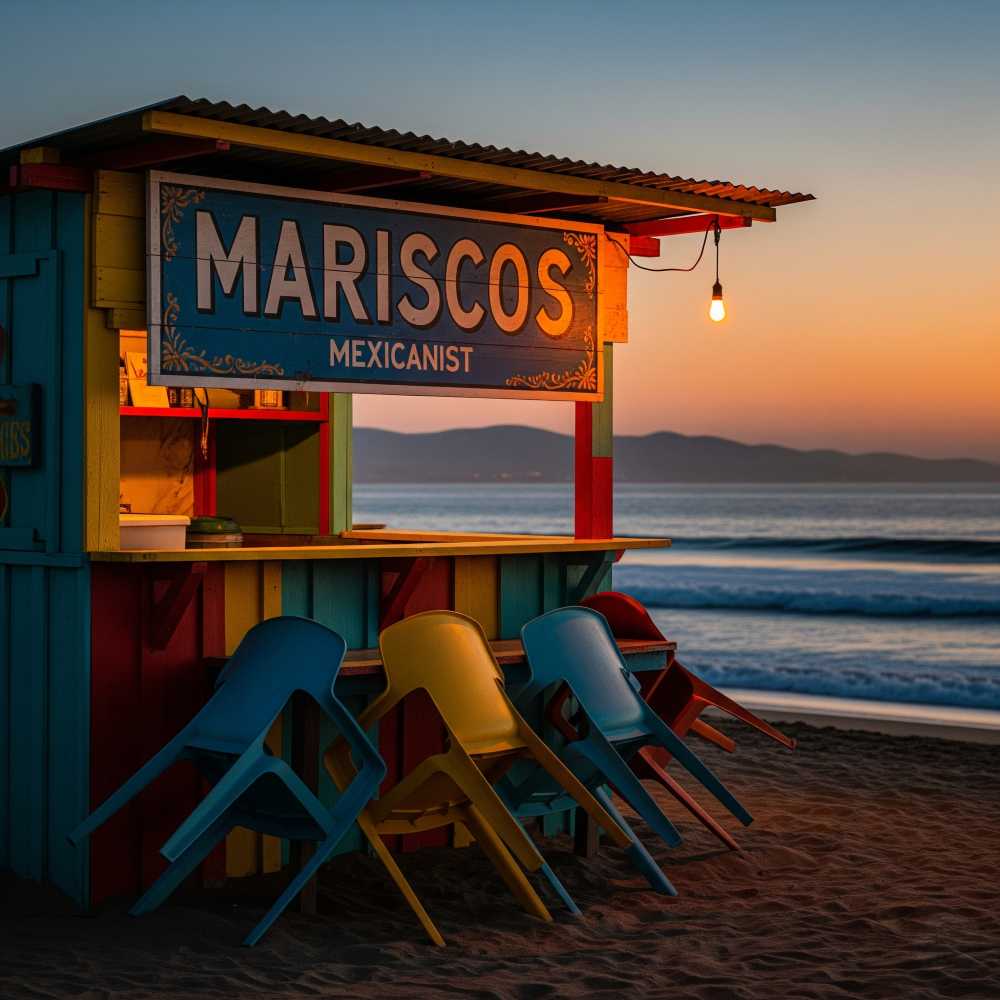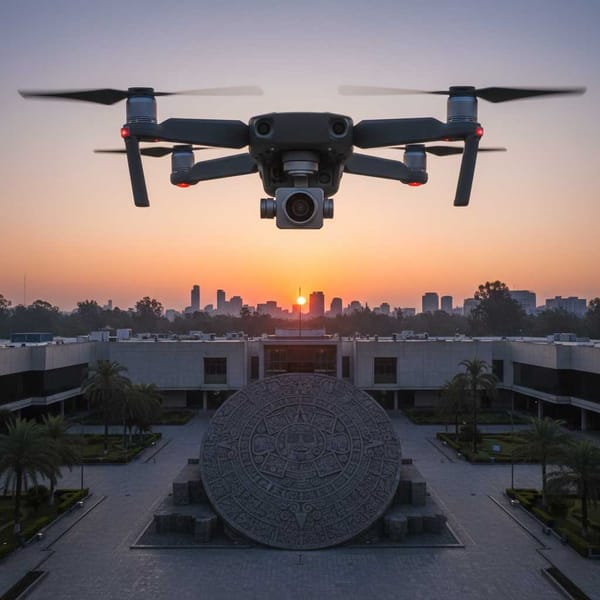How Baja’s Tastiest Bites Are Cooked in Corruption
A fish taco stand’s closure in Ensenada sparks a viral reckoning with extortion, corruption, and a shadowy network wielding the name of the Libyan Coast Guard to control Baja’s seafood trade.

It started with a video.
Not a press release. Not a police report. Not a whisper in the backroom of city hall. No—this story began with a shaky, poorly lit 47-second clip uploaded to Facebook by a man named Moisés Muñiz, owner of Mariscos El Compa Moy, a modest seafood spot on Calle Pedro Loyola in Ensenada, Baja California.
The camera wobbles. Moisés, wearing a stained apron and the kind of tired eyes only a small business owner knows, stares into the lens.
“I’m closing,” he says. “I’m tired. Tired of being a victim.”
Then, quieter: “Tired of the threats. The extortion. The cobro.”
He doesn’t name names. He doesn’t have to.
The video went viral in 48 hours. Not because it was dramatic—there were no sirens, no blood, no masked men. Just a man, a restaurant, and a confession that echoed across Baja like a gunshot in an empty plaza.
Because Moisés wasn’t alone.
He was the fifth seafood vendor in six months to be murdered, threatened, or forced to shut down.
And the only thing more terrifying than the violence?
The silence that followed.
The Fish That Bit Back
Ensenada isn’t just a port. It’s a paradox.
By day, it’s postcard-perfect: sailboats bob in the marina, tourists sip craft beer at cliffside bars, and the scent of grilled camarones al mojo de ajo drifts through the salt air. By night, it transforms—into a city where the ocean isn’t just a view, but a smuggling route; where the Guardia Costera isn’t just a coast guard, but a shadowy force accused by the UN of human rights abuses; where the line between entrepreneur and cartel associate blurs like ink in seawater.
And in the middle of it all: the fishermen.
Not the big players. Not the corporate fleets. The pescadores. The ones who wake before dawn, haul their nets, and sell their catch to restaurants like El Compa Moy. They’re the backbone of Ensenada’s culinary identity—and, increasingly, the targets of a silent war.
Because someone wants control. Not just of the fish. But of the entire supply chain.
According to anonymous sources cited in El Vigia, restaurant owners are being forced to buy from a single, unnamed supplier. No choice. No negotiation. Just a phone call: “You buy from him, or you close.”
One owner, speaking off the record, said, “They don’t even threaten you. They just show up. Smile. Say, ‘We’re here to help.’ And suddenly, your fish comes from the same guy. The price is higher. The quality? Worse. But you pay. Because the alternative…”
He didn’t finish.
The Cartel of the Ledger
Now, here’s where it gets weird.
You’d expect the cartel to be called Los Zetas, or Sinaloa, or something with a skull logo and a body count. But the group allegedly behind this isn’t even named in the official reports.
Instead, whispers point to La Guardia Costera Libia.
Wait—Libya?
Yes. Libyan Coast Guard.
But not the actual Libyan Coast Guard. At least, not directly.
According to SOS Humanity, an NGO, the real Libyan Coast Guard has been accused by a UN investigation of human rights violations and crimes against humanity—intercepting migrants, returning them to torture, selling them into slavery. They’re a brutal paramilitary force disguised as rescuers.
And now? Their name is being used as a brand.
A brand for extortion.
In Ensenada, “La Guardia Costera Libia” isn’t a foreign entity. It’s a local gang—a narcocorrido of branding, borrowing the name of a notorious force to instill fear. It’s like if a street crew in Chicago called themselves “ISIS Midwest” and started shaking down pizza shops.
It’s absurd. It’s terrifying. It’s brilliant.
Because no one knows who they are. No one knows where they came from. But everyone knows what they want: control. Money. Fear.
And the most chilling part? Some believe they’re not even the top of the food chain.
They’re allegedly linked to the CJNG—the Cartel Jalisco Nueva Generación—the most powerful drug syndicate in Mexico, known for its military-grade weapons, social media savviness, and habit of blowing up gas stations just to make a point.
So when Moisés Muñiz says “I’m tired,” he’s not just talking about long hours or bad tips.
He’s talking about a system where the only thing more dangerous than the cartel is the government’s inaction.
The Woman Who Wasn’t There
Enter: María del Pilar Ávila Olmeda, Governor of Baja California.
She’s supposed to be the fixer. The reformer. The woman who promised transparency, security, and progress.
Instead, she’s become a Rorschach test of corruption.
Former governor Jaime Bonilla Valdez—himself no stranger to controversy—has publicly accused her of ties to organized crime. Not subtle hints. Full-on allegations.
And then there’s the case of Dianeth Pérez Arreola, a journalist who asked questions about government contracts. She was cited by the Fiscalía Estatal—the state prosecutor’s office—for “irregularities.” Not for her reporting. For existing while being critical.
It’s a classic move: weaponize bureaucracy to silence dissent.
And it’s working.
Because when the state prosecutor becomes the enforcer of silence, journalism doesn’t just suffer—it disappears.
As one editor put it: “They don’t need to shoot you. They just audit you into oblivion.”
The Building on Calle Rábida
Now, let’s talk about real estate.
There’s a building in Ensenada—officially registered at Número Oficial 14, Calle Rábida Santos. It’s not fancy. Two stories. Concrete. Unremarkable.
But it’s mentioned seven times in the legal documents attached to the El Compa Moy case.
Why?
Because it’s where the Fiscalía Estatal says the violence “occurred.” But also where the Guardia Nacional was stationed “only due to the violent incident,” not because of ongoing issues with the owners.
But anonymous sources claim it’s a hub. A collection point. A place where restaurant owners are told to come, to pay, to comply.
And the property? It’s tied to a woman named Guadalupe Sánchez Rodríguez, listed as a co-demandada—a co-defendant—in a civil case involving property rights and alleged coercion.
But when you try to find her? Nothing.
No social media. No interviews. No record of her ever speaking publicly.
She’s a ghost.
Like the restaurant.
Like the justice system.
Like the fish that never made it to the plate.
The AI That Couldn’t Save Us
Here’s a surreal twist.
While Ensenada burns, Mexico’s legal scholars are debating artificial intelligence.
Yes. AI.
One thesis—hailed as a “milestone”—explains that machines are tools, not substitutes for judges. It cites European guidelines. It’s thorough. It’s… basic.
As one critic put it: “While the world debates algorithmic bias and AI’s environmental cost, Mexico is still explaining that a calculator isn’t a courtroom.”
It’s tragic. It’s funny. It’s so Mexican.
Because while academics write papers on AI ethics, Moisés Muñiz is explaining, in a Facebook video, that he can’t afford to keep his lights on.
One crisis is intellectual.
The other is existential.
And guess which one wins?
So what happens now?
Moisés hasn’t reopened.
The video is still up. Thousands of comments. Some supportive. Some mocking. Some deleted.
The Fiscalía opened an investigation. Of course they did.
But as El Vigia notes: “No concrete results… yet.”
“Yet” being the most dangerous word in Mexican justice.
Meanwhile, the Secretary of Citizen Security issued a public reminder: Don’t share personal information or photos with strangers.
Which is… helpful? If you’re worried about catfishing. Less so if armed men are demanding 10% of your weekly sales.
And the Asipona Ensenada—the port authority—won an award for “Green Management” and “Digitalization.”
An award.
For sustainability.
While fishermen are being squeezed dry.
The Real Catch
So why tell this story?
Because it’s not just about fish.
It’s about control.
Who controls the food?
Who controls the fear?
Who controls the narrative?
In Ensenada, the answer isn’t a person. It’s a system—a tangled web of cartels, corrupt officials, silent enforcers, and ghost suppliers, all feeding off the labor of people like Moisés Muñiz.
And the most terrifying part?
It’s not happening in some lawless jungle.
It’s happening in a city with Wi-Fi, Instagram influencers, and eco-certified ports.
It’s happening in broad daylight.
And the only thing louder than the silence?
The sizzle of a fish taco on the grill.
Because even when everything else fails—when the law fails, when the government fails, when justice fails—someone, somewhere, is still cooking.
Still serving.
Still surviving.
And maybe, just maybe, that’s the most human act of all.




